Culinary Guide to the Perfect Steak Internal Temp
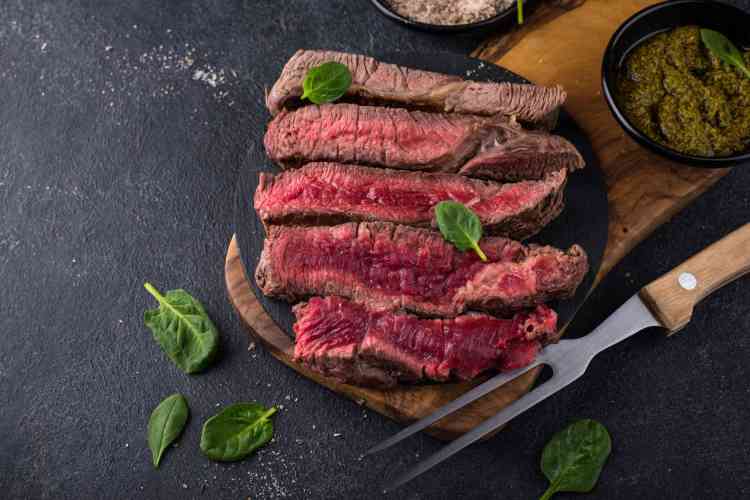
A steak's internal temp is one of the most important factors when it comes to flavor, juiciness and texture. There are various levels of steak doneness, and the meat temperature dictates the final outcome, so you need to know precisely how to get your steak to your desired level of doneness before you start cooking it.
Crafting the perfect plate of ideally cooked steak takes culinary skill, dedication and a careful, keen eye for detail if you want to get it right and serve it even better. How long do you cook a steak to get it just the way you prefer it? What internal temp for a steak should you aim for? We're exploring everything you need to know in this article.
Steak Internal Temperatures
It’s crucial to first know what the different steak internal temp levels are before you start cooking. This part is quite simple and similar to determining a salmon internal temp, for example, in that cooking your meat to a particular temperature will result in a certain texture and juiciness. Getting the meat to that precise and perfect steak internal temp is the tricky part. Once you succeed at this, you know you’ve made a restaurant-quality steak.
Every doneness level is explained below in detail.
Rare
To make a rare steak, keep the steak internal temp between 110° and 125° F, ideally 125° F. Aim for the thinnest outside layer of the steak to be nicely seared on each side while the inside is mostly raw and a vibrant red color. The best cuts of steak for rare doneness are the tenderloins. This cut is lean, without the rich, fatty marbling of cuts such as ribeyes. Cooking a tenderloin over medium results in a drier steak with less flavor.
Internal temperature: 125° F
Center: Cool and juicy with a vibrant red color
Texture: Soft and tender
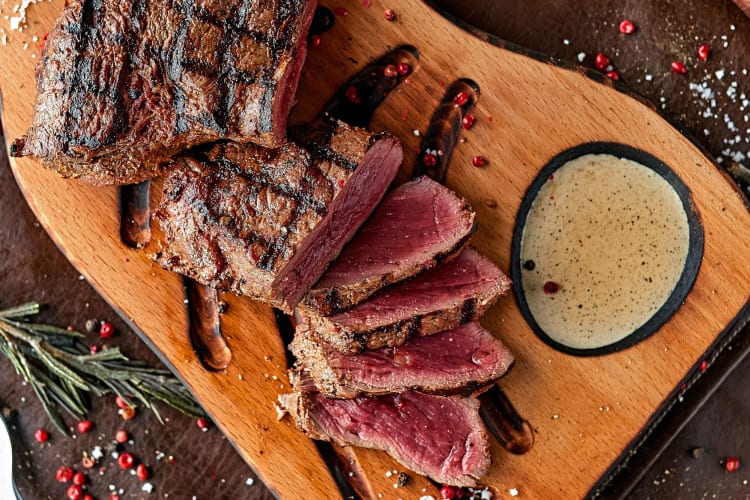
Medium-Rare
For medium-rare doneness, aim for the internal temp of the steak to be between 130° to 135° F while keeping the center soft and the outside firm. When you cut into a medium-rare steak, you’ll notice a pale pink ring near the edges that quickly deepens to a red and juicy center. It’s best to choose sirloin cuts for this doneness level as they are also a leaner cut that requires a shorter cook time to remain soft and juicy.
Internal temperature: 130° to 135° F
Center: Light pink outer ring and red center
Texture: Firm on the outside with a soft center
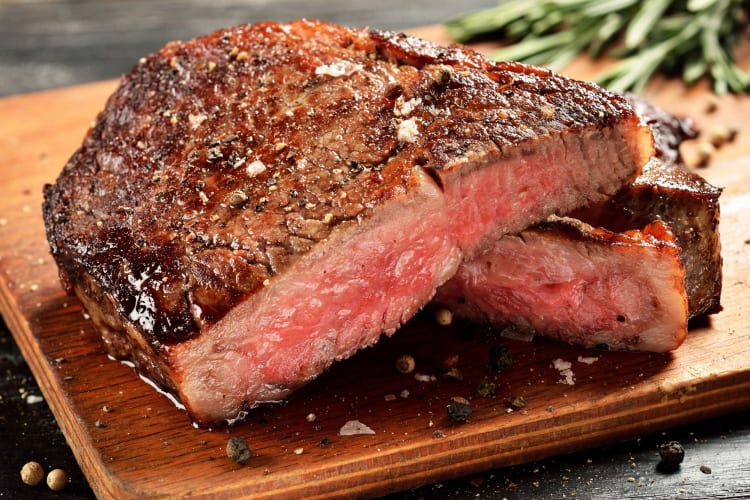
Medium
The internal temp for steak with a medium doneness level is from 135° to 140° F. The result is a reddish-pink middle with a thin red strip in the center and a thin brown outer layer. The texture of a medium steak is notably firmer but still chewy and tender. This doneness level is best paired with a fatty ribeye cut that will remain soft yet flavorful. This cut has notable marbling, allowing you to cook it longer than the cuts above. The marbling will melt and add tenderness to the center and overall more aroma.
Internal temperature: 135° to 140° F
Center: Warm pink with a brown outside layer
Texture: Well-cooked and tender
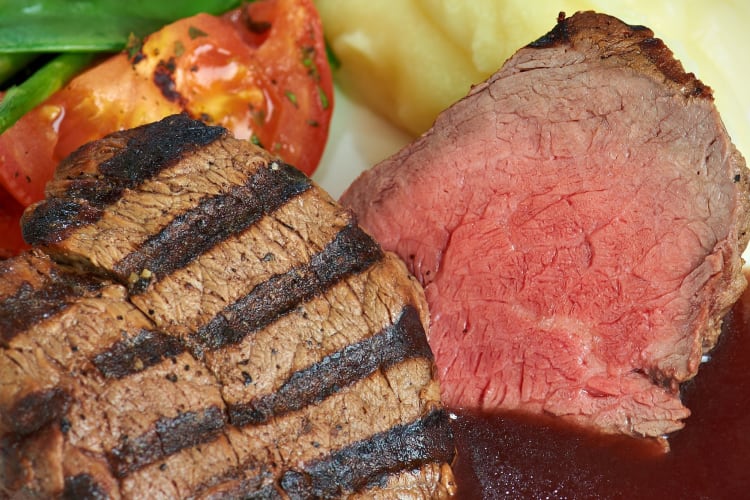
Medium-Well
A medium-well steak looks almost fully cooked and dark brown on the outside, with a grayish inner layer and a barely visible pink sliver inside. The texture is very firm or almost tough. The cuts best for medium-well doneness are those with high marbling and fat, such as the ribeye, bone-in strips and any cut of wagyu beef. The longer you cook these steaks, the more the the marbling will equally "melt" all over the meat and provide exeptional flavor and tenderness.
Internal temperature: 140° to 150° F
Center: Greyish brown with an almost non-existent pale pink sliver
Texture: Slightly tough on the outside with a tender center
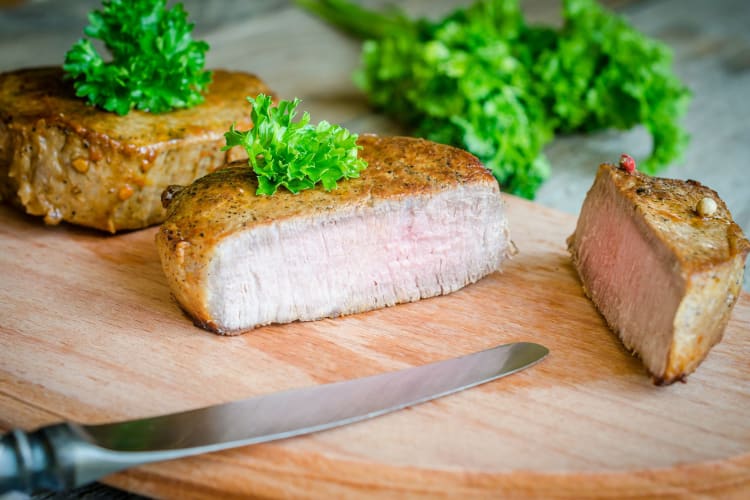
Well-Done
To reach well-done, the internal temp for steak should be 155° F or above. This steak is completely cooked and firm, without any remaining water content or pinkness. Much of the fat has been rendered out of a well-done steak. The texture is dry and tough, and the center is not juicy at all. The best cuts for this doneness are the ribeye and porterhouse. Since these cuts have the most marbling, you can cook them quite long, so the meat will have a perfect crust and moist yet cooked center.
Internal temperature: 155° F
Center: Notably brown-gray without any pink
Texture: Quite firm and dry
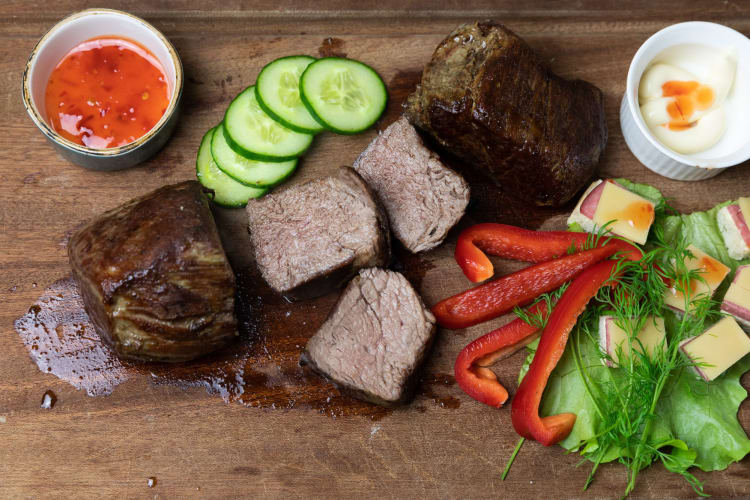
How To Check Steak’s Internal Temperature
The best way to check your steak internal temp is with an easy-to-read meat thermometer. Our favorite is the Harold Import Co. Large Face Meat Thermometer because of its versatility and size, but any will do. The key thing is knowing when in the cooking process to use it.
Check your steak's internal temperature once in the middle of cooking to ensure you don't overshoot your desired doneness and once after the meat has rested to ensure a perfect preparation from start to finish.
Carefully insert the thermometer probe in the steak’s center and through the side (without touching any fat or bone) to reach the center. After a few seconds, you will see the steak internal temp shown on the thermometer display.
Remove the steak from heat 5° degrees earlier than the desired steak internal temp because the meat continues to cook when resting (a phenomenon called carryover cooking).
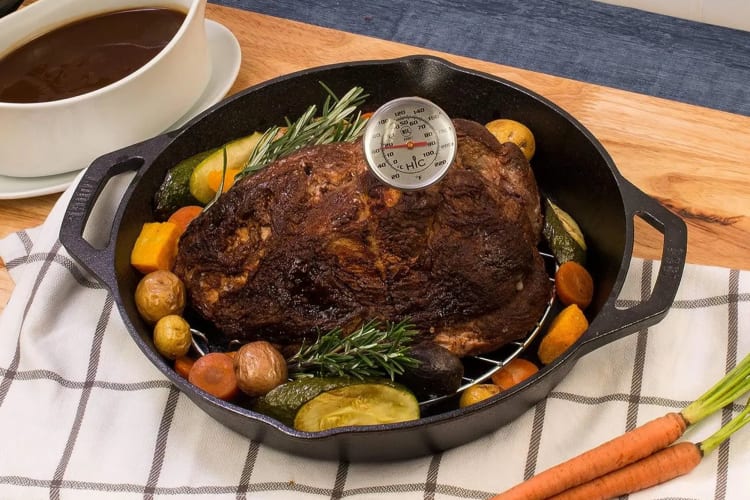
Steak Cooking Times
If you still need clearer guidance on how to cook the perfect steak, just remember a few simple things. The shorter you cook the steak, the more vibrant and red the center and color will be, and the texture will be more tender and soft. The longer you cook it, the darker the color will turn by the second, and the texture will be notably tougher and chewier.
The softest and juiciest levels of doneness require a lower steak internal temp. The juiciest are the rare and medium-rare, and the least juicy are medium-well and well-done. Also, remember that the thicker the steak, the juicier the middle will be.
Below are the approximate cooking times for boneless steaks of 1-1.5 inches thickness (a standard steak cut).
Grill
Grilling is probably the most popular way to cook steaks. Before grilling the steak, season it and let it sit at room temperature for at least half an hour. Then clean and preheat your grill and grease it slightly. Remember that the average cooking time depends on your steak cut type.
-
Rare: 125° F steak internal temp: Three to four minutes on each side with the grill preheated to 450° F.
-
Medium-Rare: 130° - 135° F steak internal temp: Five to seven minutes on each side with the grill preheated to 450° F.
-
Medium: 135° - 140° F steak internal temp: Seven to eight minutes on each side with the grill preheated to 450° F.
-
Medium-Well: 140° - 150° F steak internal temp: Eight to nine minutes on each side with the grill preheated to 450° F.
-
Well-Done: 155° F steak internal temp: Ten minutes on each side with the grill preheated to 400° F.
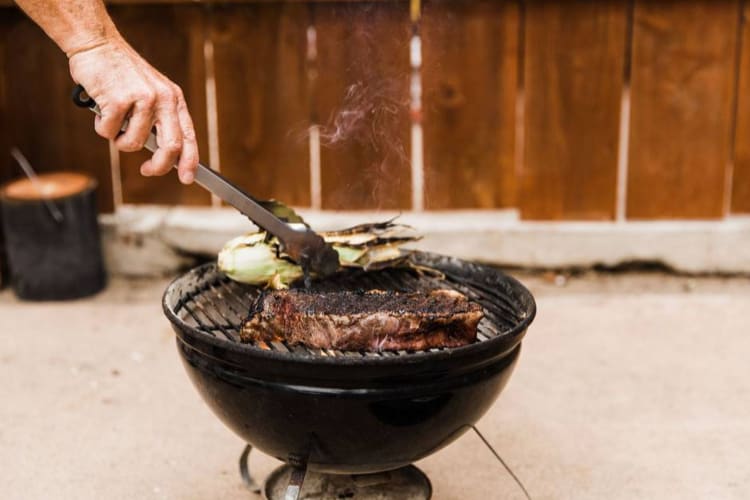
Stovetop
Another popular way to cook a steak is on the stovetop in a pan you might already have in your household. This is a simpler way to cook steak because you can conveniently do it at home anytime, and it’s less time-consuming.
Similar to the grilling method above, let the steak sit at room temperature for a while before cooking, and season it as you like. Preheat the stovetop and choose the best pan for steak that you own. Preheat the pan for around 20 minutes.
For each level of doneness here, set the stovetop to 450° F initially and reduce it to 375° F before you finish cooking.
Again, for a steak 1-1.5 inches thick, the cook times are as follows:
-
Rare: 125° F steak internal temp - Two minutes per side
-
Medium-Rare: 130° - 135° F steak internal temp - Three to four minutes per side
-
Medium: 135° - 140° F steak internal temp - Four minutes per side
-
Medium-Well: 140° - 150° F steak internal temp - Five minutes per side
-
Well-Done: 155° F steak internal temp - Six to seven minutes per side
With stovetop cooking, ensure the pan is very hot, and open up all the windows because it is about to get quite smoky in your home!

There’s no single answer to what the ideal steak internal temp is. It all depends on whether you prefer a juicy, tender cut of beef with no trace of pink or a chewier, browner piece of meat. The key thing is knowing how to get the exact steak that you’re aiming for. Whether grilled or cooked on the stovetop, you can easily master this popular dish if you follow the cooking instructions closely and get plenty of delicious practice.
For even more ways to explore your favorite foods, check out other online experiences happening on Cozymeal.
